
Collection
Special Issue: Towards a Climate Resilient Society for the Desired Sustainable Futures in Africa
- Submission status
- Closed
Editors
-
Pius Zebhe Yanda
Pius Zebhe Yanda is a Professor in Physical Geography. He has served the University of Dar Es Salaam in different academic positions for 36 years. He holds his PhD in Pysical Geography from Stockholm University. He is a Research Professor the University of Dar es Salaam. Professor Yanda has worked extensively in natural resources management, environment and climate change related studies in the region as well as in Tanzania. Between 2005 and 2007, Professor Pius Yanda was involved in a number of IPCC Scientific Assessments as Lead Author.
-
Edmund B. Mabhuye
Dr. Edmund B. Mabhuye holds a PhD in Climate Change and Sustainable Development in the field of Climate Change Adaptation and Mitigation Options and has a background in Natural Resource Assessment and Management. He works with the Dar es Salaam University – Institute of Resource Assessment and Coordinating the Centre for Climate Change Studies. His research interest includes climate change science, Impacts, Adaptation and Mitigation Options. In addition, he has been doing research linking climate change with natural resources management, livelihood analysis and addressing sustainability issues. Currently, Dr. Mabhuye is coordinating two resea
-
Brown Gwambene
Brown Gwambene holds a PhD and Master's degree in Natural resource assessment and management with a background in Geography and environmental studies. Currently is a lecturer and researcher at the University of Iringa, Tanzania, in thef aculty of Science and Education. He has been involved in academic, project management, research, capacity building and consultancy in the field of natural resources, livelihood, climate change adaptation, farming industry, ecological, agricultural innovation systems, rural and coastal development, forestry management, climate-smart agricultural practices, and land resource management.
Articles (19 in this collection)
-

-
Determinants of Farmers’ Adaptation Intent And Adoption of Adaptation Strategies To Climate Change And Variability In Mwanga District, Tanzania
Authors
- Francis R. Bagambilana
- William M. Rugumamu
- Content type: OriginalPaper
- Published: 13 March 2023
- Pages: 785 - 804

-
Guest Editorial: Towards a Climate Resilient Society for Desired Sustainable Futures in Africa
Authors
- Pius Zebhe Yanda
- Edmund B. Mabhuye
- Brown Gwambene
- Content type: EditorialNotes
- Published: 21 January 2023
- Pages: 1 - 2
-
Gender Perspectives of Responses to Climate Variability and Change among Farm Households in Southeast Nigeria
Authors (first, second and last of 4)
- Onyinyechi Ifeanyi Nnadi
- James Lyimo
- Michael C. Madukwe
- Content type: OriginalPaper
- Published: 15 November 2022
- Pages: 201 - 213
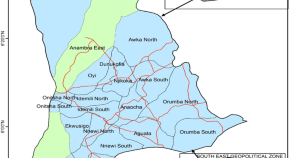
-
Tree biomass, carbon stock characteristics and ground beetles (Coleoptera: Carabidae) diversity in the Uzungwa Scarp Forest Nature Reserve, Tanzania
Authors
- Anna N. Mwambala
- Bruno A. Nyundo
- Elikana Kalumanga
- Content type: OriginalPaper
- Published: 20 October 2022
- Pages: 190 - 200

-
Climate-Change-Induced Weather Events and Implications for Urban Water Resource Management in the Free State Province of South Africa
Authors (first, second and last of 4)
- Fumiso Muyambo
- Johanes Belle
- Israel R. Orimoloye
- Content type: OriginalPaper
- Published: 03 October 2022
- Pages: 40 - 54

-
Adopting Clean Technologies to Climate Change Adaptation Strategies in Africa: a Systematic Literature Review
Authors
- Ephraim Daka
- Content type: OriginalPaper
- Open Access
- Published: 26 August 2022
- Pages: 87 - 98

-
Relevance of Neglected and Underutilized Plants for Climate Change Adaptation & Conservation Implications in Semi-arid Regions of Tanzania
Authors
- Catherine Aloyce Masao
- John Igoli
- Emma T. Liwenga
- Content type: OriginalPaper
- Published: 12 May 2022
- Pages: 114 - 130

-
Understorey Seedling Bank in Forest Areas with a Differing Period of Recovery in Mabira Central Forest Reserve, South Central Uganda
Authors (first, second and last of 5)
- Josephine Esaete
- Vincent B. Muwanika
- John R. S. Tabuti
- Content type: OriginalPaper
- Published: 06 April 2022
- Pages: 159 - 169

-
Climate Change and Variability Impacts on Agricultural Production and Food Security for the Smallholder Farmers in Rungwe, Tanzania
Authors
- Brown Gwambene
- Emma Liwenga
- Claude Mung’ong’o
- Content type: OriginalPaper
- Published: 06 April 2022
- Pages: 3 - 14

-
Pathways of REDD+ Piloting in Enhancing Sustainable Forest Management: The Case of Masito-Ugalla Ecosystem, Western Tanzania
Authors
- Edmund B. Mabhuye
- Pius Z. Yanda
- Anselm Mwajombe
- Content type: Article
- Published: 30 March 2022
- Pages: 55 - 73
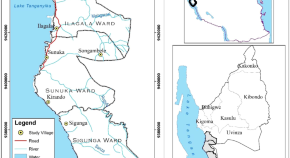
-
Climate Change Vulnerability Assessment for the Rondo Dwarf Galago in Coastal Forests, Tanzania
Authors
- Mohamed Haji
- Jared Sylivester Bakuza
- Content type: OriginalPaper
- Published: 23 February 2022
- Pages: 145 - 158

-
Exploring farmers’ adaptation strategies to water shortage under climate change in the Tunisian semi-arid region
Authors
- Lamia Soltani
- Thuraya Mellah
- Content type: OriginalPaper
- Published: 18 February 2022
- Pages: 74 - 86

-
Living and Responding to Climatic Stresses: Perspectives from Smallholder Farmers in Hanang’ District, Tanzania
Authors
- Maliki Ally Maliki
- Noah Makula Pauline
- Content type: OriginalPaper
- Published: 22 January 2022
- Pages: 131 - 144

-
Perceived Effective Adaptation Strategies against Climate Change Impacts: Perspectives of Maize Growers in the Southern Highlands of Tanzania
Authors
- Y. Shabani
- N. M. Pauline
- Content type: OriginalPaper
- Published: 08 January 2022
- Pages: 179 - 189
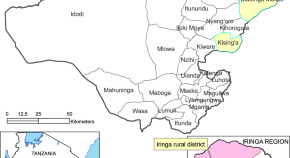
-
The Influence of Soil Organic Carbon and Climate Variability on Crop Yields in Kongwa District, Tanzania
Authors
- Msafiri Y. Mkonda
- Xinhua He
- Content type: OriginalPaper
- Published: 07 January 2022
- Pages: 170 - 178
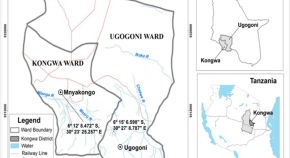
-
Tracking Pathways to Recovery from Climate Shocks and Resilience Enhancement
Authors (first, second and last of 4)
- Pius Z. Yanda
- Edmund B. Mabhuye
- Sixbert J. Msambichaka
- Content type: OriginalPaper
- Published: 29 November 2021
- Pages: 99 - 113
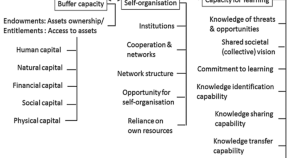
-
Dynamics of Land Management and Implications on Pastoral Livelihoods in Northern Tanzania
Authors (first, second and last of 5)
- Pius Zebhe Yanda
- Edmund Mabhuye
- Lucas Elius Yamat
- Content type: OriginalPaper
- Published: 26 November 2021
- Pages: 29 - 39

-
Linking Coastal and Marine Resources Endowments and Climate Change Resilience of Tanzania Coastal Communities
Authors
- Pius Zebhe Yanda
- Edmund Bwanduruko Mabhuye
- Anselm Mwajombe
- Content type: OriginalPaper
- Published: 17 November 2021
- Pages: 15 - 28





